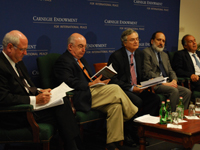{
"authors": [
"Mike Moore",
"Kemal Dervis",
"Uri Dadush",
"William Shaw",
"Moisés Naím"
],
"type": "event",
"centerAffiliationAll": "",
"centers": [
"Carnegie Endowment for International Peace"
],
"collections": [],
"englishNewsletterAll": "",
"nonEnglishNewsletterAll": "",
"primaryCenter": "Carnegie Endowment for International Peace",
"programAffiliation": "",
"programs": [],
"projects": [],
"regions": [
"North America",
"Middle East",
"South Asia",
"East Asia",
"Western Europe"
],
"topics": [
"Economy"
]
}
Power Implications of the 21st Century Economy
Tue, June 7th, 2011
Washington, D.C.
Within a generation, developing countries will likely account for more than two-thirds of G20 output and nearly 70 percent of global trade. This shift will have major implications for both international relations and global governance.
In their new book, Juggernaut: How Emerging Markets Are Reshaping Globalization, Carnegie’s Uri Dadush and William Shaw explore the broader implications of the rise of developing countries. Carnegie hosted a discussion with Dadush and Shaw, the Brookings Institution’s Kemal Derviş, former head of the United Nations Development Programme, and the Rt. Hon. Mike Moore, the current ambassador and former prime minister of New Zealand and the former director-general of the World Trade Organization. Carnegie’s Moisés Naím moderated.
The Rise of Developing Countries
The current moment is unique: after centuries of stagnation, world output and living standards are growing more rapidly than ever before. This trend has the potential to continue, presenting huge opportunities to lower poverty and expand markets.
- Break from the Past: Dadush explained that per-capita income and population only began to advance after the Industrial Revolution. Even then, it was largely limited to Europe and select colonies. With the exception of Japan, the growth spread to non-Western countries only after decolonization and the fall of the Berlin Wall.
- Rise of Developing Countries: Over the next forty years, developing countries will provide the bulk of economic growth, said Dadush. This growth will be driven by an increase in labor force, the further establishment of conditions conducive to growth (such as openness to trade), high savings and investment rates, and exchange-rate appreciation in developing countries. As a result, by 2050, six of the world’s seven largest economies will be developing countries, Dadush projected. Dervis suggested that real exchange-rate appreciation—which is already ahead of projections in China—may lead to even greater growth in developing countries.
- Opportunities for Growth: By 2030, the bulk of the middle class will reside in developing countries, presenting a huge market opportunity, Dadush explained. Poverty will also fall significantly, even in India and Sub-Saharan Africa, where it will remain the most prevalent.
Risks to Growth
Nevertheless, Dadush argued that four interconnected risks could slow this process, or even stop it altogether.
- Geopolitical Breakdown: Historically, the rise of great economic powers has been accompanied by conflict, from colonization to regional disputes. Going forward, Dadush predicted that conflict in Asia—specifically, among China, Japan, and India—poses the biggest risk to growth. Moore agreed that some power struggle is all but inevitable, particularly given the incredible pace of change.
- Financial Crisis and Depression: Though the Great Recession originated in advanced countries, Dadush noted that developing countries—which have weaker regulatory and governance institutions—have generally been responsible for financial crises in the past. As developing countries become more integrated into the global economy, the risk of financial crises will rise, as will their potential impact.
- Protectionism: By 2050, lower-wage economies will dominate world trade, which, Dadush explained, could incite the increased use of protectionist measures against them, as China does today. In addition, trade will be concentrated between developing countries, where tariffs are highest and protectionism is most common.
- Climate Change: Using conservative growth rates, Juggernaut projects that a four-degree Celsius rise in world temperatures is possible by 2050, even if countries hold to current international agreements. By then, developing countries will be responsible for the majority of carbon emissions. Dadush argued that this factor poses the biggest risk to continued economic growth and rising living standards.
Dervis noted that, while all of these risks are real, Dadush and Shaw fail to provide a quantitative link between them and the growth rates they present in Juggernaut. The growth rates show the global economy’s potential, but the risks may significantly lower the actual result, he said. Shaw argued that, though many accidents, from financial crises to geopolitical conflicts, have occurred over the last forty years, global growth has continued.
Globalization and International Agreements
In addition to the four risks outlined by Dadush and Shaw, the rise of developing countries will also complicate the process of achieving multilateral agreements, as differences between advanced and developing countries in per-capita income, priorities, perceptions, and capacity to execute will remain significant.
- The Biggest and the Poorest: According to Juggernaut, China, the world’s largest economy in 2050, will still enjoy only one-third of U.S. per-capita income, while incomes in India, the third largest economy, will be one-tenth of those in the United States. Dadush predicted that, as a result, the two groups of countries may focus on different policies. Developing countries will continue to prioritize growth and development, while advanced countries focus on other issues, like the environment and labor standards.
- Differences in Potential: Even where their priorities align with those of advanced countries, developing countries will have a harder time instituting change, given their weaker institutions and poorer governance. Dadush and Shaw noted that, while the improvements in more easily measurable policies—including trade, macroeconomic management, and financial regulation—have been significant, particularly in Asia, improving governance and eradicating corruption will take more time. Moore suggested that bringing countries into multilateral institutions can help encourage developing nations to adopt good practices, as China’s membership in the WTO has done.
- Income Inequality: Dervis suggested that differences within countries are also likely to grow, as income inequality—clearly entrenched in the United States and rising in Europe and China—increases across the board. Special interests will increasingly control politics, impacting policies such as tax rates for high-income individuals and multinational corporations, and leaving low-wage workers behind.
Principles for Agreement Going Forward
The four main arenas of global economic interaction—trade, finance, migration, and the global commons—will be most affected by the rise of developing countries. Yet none of these areas has the institutions or policies in place to reap all of the potential benefits from growth or even ensure that the transition as developing countries rise is smooth. The acceptance of two principles outlined in Juggernaut may help to change that, Dadush and Shaw argued.
- Critical Mass: Dadush argued that universal agreements, such as those pursued by the UN on climate change and the WTO’s long-languishing Doha Round, hold little promise. Instead, the international community must focus on agreements between the critical mass of large players, which will vary by issue—an approach that is both efficient and legitimate, he said. Moore argued that universal institutions still have the capacity to effect change, but can only do what their membership allows. Dervis suggested that markets will also help to manage most of the tensions, though Dadush responded that they cannot manage climate change—the biggest worry.
- Building a Global Conscience: Dadush argued that, because power remains concentrated in sovereign nations, building greater country awareness of the shifts to come and the policy changes necessary for the greatest global good is critical. Moore agreed, arguing that a free market without values, rules, and accountability will become a black market.
Carnegie does not take institutional positions on public policy issues; the views represented herein are those of the author(s) and do not necessarily reflect the views of Carnegie, its staff, or its trustees.
Event Speakers
Mike Moore
Kemal Dervis
Dadush was a senior associate at the Carnegie Endowment for International Peace. He focuses on trends in the global economy and is currently tracking developments in the eurozone crisis.
William Shaw
Former Visiting Scholar, International Economics Program
Shaw was a visiting scholar in Carnegie’s International Economics Program. He is the co-author of Juggernaut: How Emerging Markets Are Reshaping Globalization.

